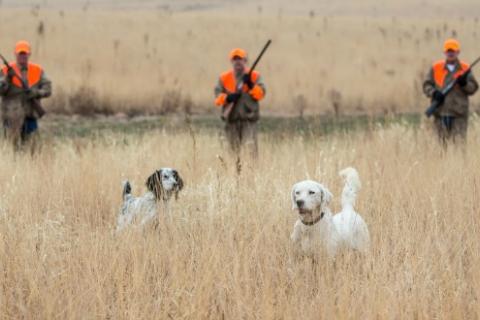
The day was off to a great start. Birds were flying, the sun was shining, and spirits were high. Then the unthinkable happened—my hunting buddy’s English Setter collapsed mid-stride.
Tip: Shop dog training supplies and equipment at Bass Pro Shops
Shocked beyond belief, he knelt over his best friend and administered mouth-to-mouth resuscitation to no avail. He cried without shame.
 Unfortunately, tragedies like this occur every year. The good news is that there’s a lot owners can do to prevent and treat ailments in the field.
Unfortunately, tragedies like this occur every year. The good news is that there’s a lot owners can do to prevent and treat ailments in the field.
Visit the Dog Vet
Regular veterinary checkups are a must to keep your dog as healthy as possible. Skipping appointments or slacking on recommended feeding and supplement regimens is asking for problems. A visit to the vet a month or two before hunting season may save your dog’s life.
Take a Snack Break
The two things dogs need in the field are energy and hydration. A dog’s brain needs a simple sugar called glucose. A hard hunting dog will blow through the body’s store of sugars quickly.
Often, when a dog seems to be ignoring commands and bumping birds, they are actually experiencing mental fatigue due to a lack of glucose in their systems. The old adage that a hungry dog hunts better is simply not true.
Dogs will benefit from a glucose source 15 minutes before the hunt begins and every 30 to 45 minutes during the hunt. This procedure allows the sugar stores in the muscles to last longer, resulting in better mental and physical performance in the field.
Watch the Weather
Well-conditioned dogs can typically withstand a wide variety of temperatures and environments, but don’t forget that they are still susceptible to the elements.
Keep an eye on your four-legged hunting partner, especially in the heat. Pour water on them, but don’t allow them to over drink. Offer small drinks frequently, rather than extended breaks. If you notice them still struggling, take time to find some shade or an air-conditioned vehicle. At that point you’ll probably welcome a cool-down too.

Dog Vest
Even with their furry coat, dogs are vulnerable to hypothermia. Cold, windy days are especially brutal. Purchase a dog hunting vest to help your pup conserve core heat and do your best to keep retrievers dry when the action slows. If you notice signs of hypothermia wrap your dog in your coat and take it to a vehicle or indoors as soon as possible. Cover them in a space blanket and place a hand warmer or two inside. This well help Fido recover body heat quickly.
Tip: Shop Cabela's Nortern Flight Neoprene Dob Vest at www.basspro.com
Prepare for Injuries Your Dog Might Have on a Hunt
Pack a basic medical kit to take care of common injuries that can occur on a hunt. Cuts and lacerations to the dog’s face and pads often happen when retrieving birds or encountering environmental hazards such as barbed wire. Such wounds should be cleaned out with sanitary water then treated with a shot of peroxide and a dose of Betadine.
Flea, mite and tick infestations are common in underground dens that dogs might investigate. Powder your dog after hunts and remove any ticks. Recheck your pup in a few days to ensure no parasites are still hanging around.
Before Taking Your Dog Hunting, Ask About Hazards
Always ask private landowners if there are traps or poisons located on the property. Simply staying away from these dangers is the best way to prevent a scary situation.
If your dog does become stuck in a trap, release it as quickly as possible. A muzzle for your dog can prevent him from biting you in the process. Conibear traps are a different story. See this website for more information about releasing your dog from a conibear trap
Poisoning for rodents is a common practice, and a dog’s keen sense of smell can get it into serious trouble. If you are sure your dog has swallowed poision, pouring hydrogen peroxide down your dog's throat can cause him to vomit it up. If he has ingested anti-freeze rush your dog to the vet immediately.
Every hunter wants to enjoy long days afield with his dog without problems, but preventing and being prepared for emergencies is the best medicine.
- 6207 views

